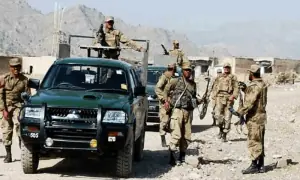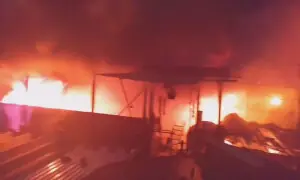Don't go home for Eid and other warnings to Baloch students
6 min readStudents from Balochistan are not ill-acquainted with the anxiety of what it takes to acquire a higher education. Indeed, hard-won admissions to universities across Pakistan are seen as no small accomplishment for many of these bright young minds, who have to contend with the hardships of all that living far away from home entails. And so the devastating success of a female suicide bomber from the province’s district Kech at the University of Karachi last week sent a ripple of fear through other campuses for fear of reprisals. There has been, you see, a pattern of Baloch students not turning up to class…
Last Tuesday, the attacker, identified as Shari Baloch, a 31-year-old mother of two, killed four people, including three Chinese citizens, at Karachi university’s Confucius Institute. The attack was claimed by the banned Balochistan Liberation Army, which has long targeted Chinese people in Balochistan. This time, though, the claim came with a chilling sense of triumph: this was the BLA’s first female suicide bomber and there were hundreds more.
This was a third major attack in a little over a year after nine Chinese nationals were killed in July 2021 in an explosion en route to the Dasu hydropower project that part of the China-Pakistan Economic Corridor. Pakistan blamed the explosion on a mechanical failure. Pakistan agreed to pay $11.6 million in compensation to their families. A month later, in August 2021, a boy suicide bomber targeted Chinese engineers, leaving one injured in Gwadar.
Meanwhile, investigations continue into the KU attack. Aaj News reported that at least 20 students were questioned by investigators who were keen to know who Shari Baloch’s local facilitators could have been. She was enrolled in a postgraduate programme on campus.
Calls for caution were soon made after the attack. More significantly, Balochistan lawmakers, including Balochistan Awami Party’s Bushra Rind, Zobaida Jalal and Mahjabeen Sheran, held a press conference in Quetta last week to condemn the attack and express their fear of the fall-out. They said that it was too early to jump to conclusions until the full details of the attack emerged and how the mother of two young children could have been persuaded to carry out such an act.
Suicide attack in Karachi university on Chinese was pre-planned and terrorist plan to destroy the peace of Balochistan and Pakistan.
— Bushra Rind (@RindBushra) April 28, 2022
Pak China friendship
zindabad pic.twitter.com/UmRKn6jm6v
MNA Zobaida Jalal expressed concern that the attack would have far-reaching consequences for Kech, the area the suicide bomber hails from.
The calls for caution were not unfounded. Balochistan students in Punjab have been worried with many deciding against going home during the Eid break.
“Now, our parents are telling us not to return home [in the wake of the suicide attack in Karachi] but we no longer feel secure on campus either,” said a Balochistan student at Punjab University speaking on condition of anonymity. “I can no longer sleep alone in my room.”
We left Balochistan because of security concerns and now we are facing the same problem elsewhere, said a Balochistan student enrolled at the Quaid-e-Azam University in Islamabad.
They cited the case of Bebagr Imdad, an English Literature student at NUML. “He was visiting Punjab University to meet his cousin and the two had plans to leave together for their hometown for Eid,” said the student.
Pakistan: We are deeply concerned about reports of the disappearance of Baloch student, Bebagr Imdad from the Punjab University campus yesterday. We call on Pakistani authorities to disclose the whereabouts of Bebagr and if in their custody, immediately release him or promptly
— Amnesty International South Asia (@amnestysasia) April 28, 2022
Bebagr has gone missing. There is a video ostensibly showing men in plainclothes bundling him into a white vehicle during broad daylight on campus.
Beyond shameful how the state continues to harass, abduct and disappear the Baloch, especially Baloch students. Demand the immediate release of Bebagr Imdad who has been abducted in broad daylight from PU. Enforced disappearances must be criminalized. #ReleaseBebagrImdad pic.twitter.com/VmckUsCoqA
— Mohsin Dawar (@mjdawar) April 27, 2022
Lawyer Imaan Zainab Mazari-Hazir, who has represented Baloch students in such cases, says the situation is explosive and volatile.
Students from Islamabad and in universities across Punjab say they have experienced harassment and mistreatment at the hands of the university administration, the faculty and in some instances from fellow students as well.
The administration of Quaid-e-Azam University has been accused of “ethnic profiling” with Baloch students going to the Islamabad High Court against it. The chief justice has issued orders for the interior secretary to address their concerns.
“In such a situation, we cannot be sure whether to raise our voice for our missing brethren fearing that we could end up with the same fate,” said the QAU student. "They already have our details..."
They cite the case of student Hafeez Baloch, who was doing his MPhil at QAU. While visiting Khuzdar in February, he was allegedly dragged out of a classroom where he taught underprivileged children as a volunteer.
Following extensive protests by Baloch students group as well as social media pressure, the authorities produced Hafeez over a month later, in a different district, while charging him with possession of explosives. The Baloch students have questioned the charges.
“If any of us is involved in any illegal activity, please take action legal against us,” said the student from QAU. “There are between four thousand to five thousand Baloch students in Islamabad and Punjab and each one of us feels extremely insecure.”
Lawyer Imaan Zainab Mazari-Hazir, who attended the protests demanding the recovery of Hafeez Baloch, says she witnessed first-hand the treatment meted out to Baloch students. “The state is treating students, who are trying to build a better future for themselves, like criminals.”
There has been a history of discrimination on campus and of students being treated with suspicion. Some Baloch students who passed an entrance test at one university were asked in the interview which militant group they supported or received training from. Others were asked whether they supported armed struggle.
They mentioned reprisals after a suicide attack in Lahore’s Anarkali Bazaar, which was claimed by one Baloch separatist group. “The rooms of Baloch students at Punjab University were searched following the incident,” said one student.
In Karachi, the investigation into the Confucius Institute suicide bombing continues. Fortunately, many of the Balochistan students had already left for home for Eid before the attack on April 26.
According to a Sociology student at the University of Karachi, who hails from Lasbela, “Many others already had plans to return home and they are going ahead despite the attack.”
She said she had not faced discrimination on campus the likes of which they had heard was experienced by Baloch students in Punjab and Islamabad.
“There were reports that Baloch students had been asked not to leave the campus in the wake of attack,” she said. “This wasn’t true. Students of all ethnicities were asked not to leave campus and the restriction was removed within 48 hours after the authorities did their investigation.”
She acknowledged there was serious concern within the Baloch student community over the incident as they were wary of backlash. “Some of us are consciously concealing our Baloch identity in public so as not to attract attention but we haven’t faced targeted discrimination or harassment.”
The student, who also works in Karachi, said that the KU administration also contacted Baloch students to inquire about their mental being while offering counselling if required.
For the latest news, follow us on Twitter @Aaj_Urdu. We are also on Facebook, Instagram and YouTube.






















Comments are closed on this story.